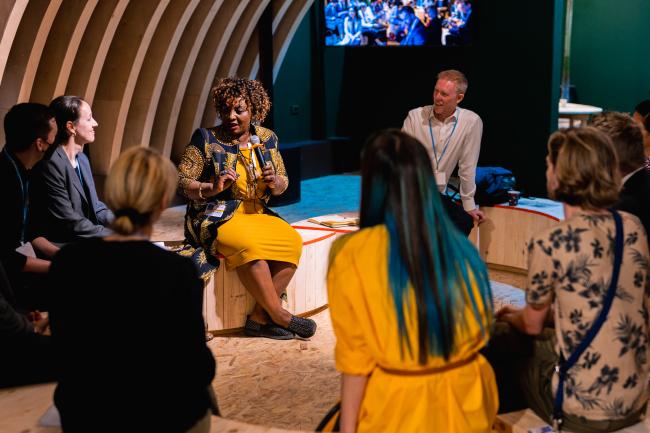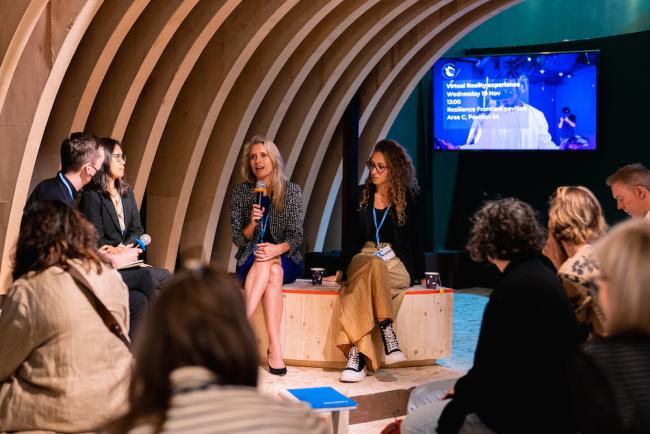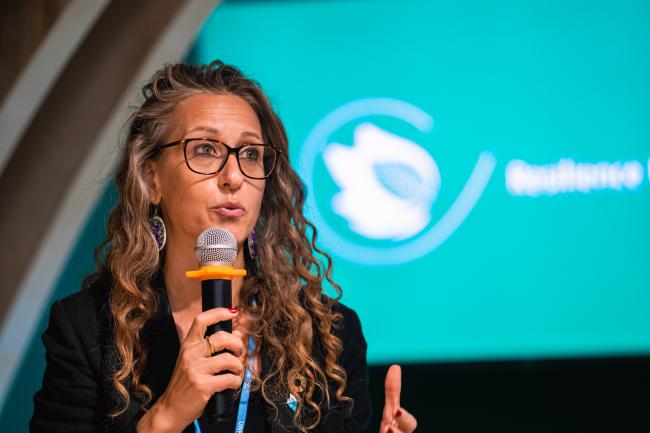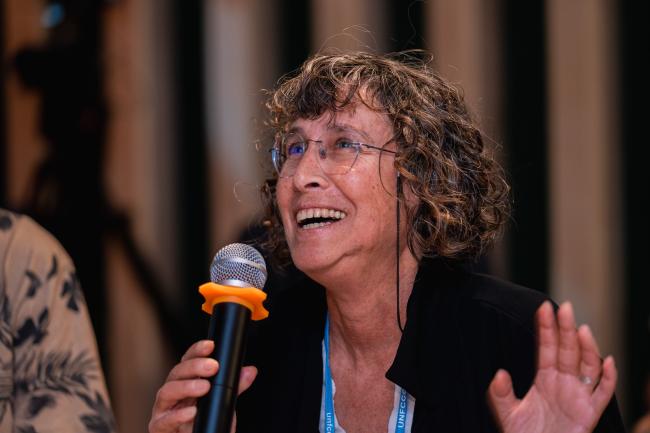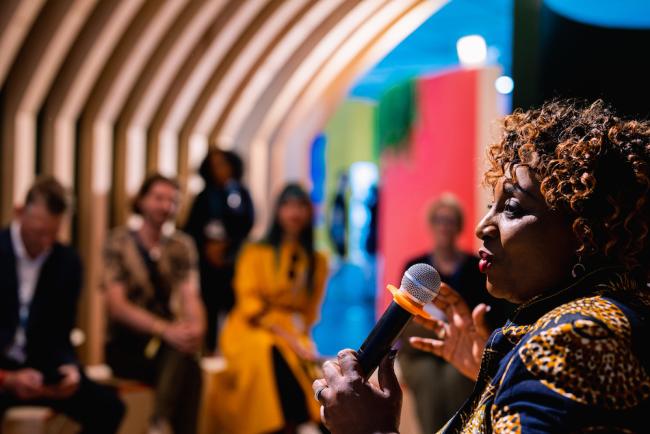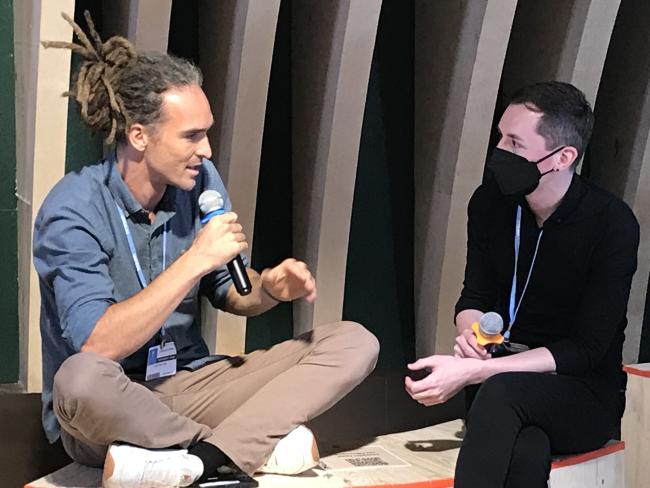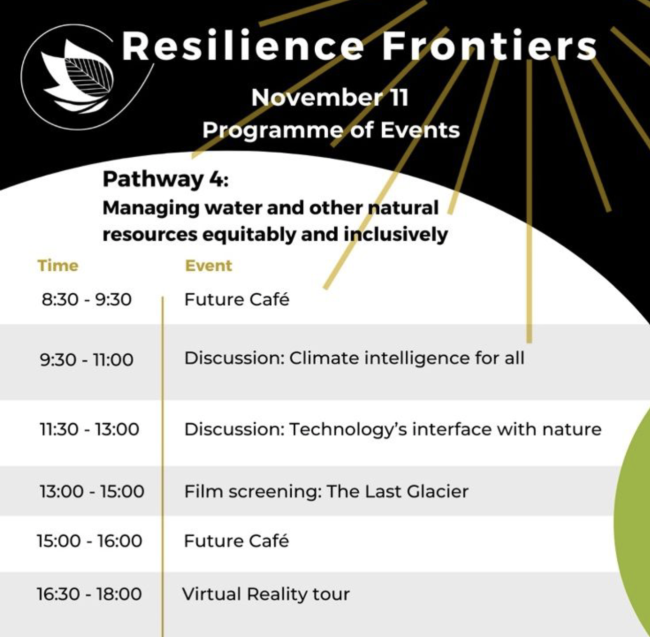Ensuring Universal Equitable Coverage of, and Open Access to, (Big) Data and Information
Continuing to inspire new thinking about pathways to a healthier and more harmonious tomorrow, the Resilience Frontiers Pavilion focused its third day on issues of equity and wellbeing around big data, information, and technology. In two morning events along the Pavilion’s Pathway 3, experts and practitioners reflected on how technology, often tied to relentless acceleration and widening power gaps, can be used in ways that enhance relationships between people and their environments.
In the day’s first event, speakers and participants discussed the question, “Is life better with tech?” Moderator Paris Marx, author, guided the conversation through issues such as the diverse meanings of technology, its varied purposes, and who gets to decide its many uses.
Michal Nachmany, Founder, Climate Policy Radar, underscored the importance of ethical frameworks for technology. Rather than a “reductionist” approach to technology that would lead us to stop using it, thereby abandoning the advantages it can provide, we need to “establish boundaries” and enhance the transparency of data.
Taking a different perspective, Xiaomeng Shen, United Nations University, urged looking at the “root cause” of problems such as climate change. She noted that policymaking around technology is often imbued with a language of competitiveness linking notions of progress to material wealth. Shen emphasized the need to go beyond current thinking, which focuses on how efficient machines can “fix things,” and instead ask, “Am I doing it for myself or for humanity? Sometimes you have to sacrifice to make humanity flourish.”
Gayle Schueller, 3M, highlighted that we are constantly learning how to put technology to use in ways that improve lives. She noted that people at her company are given the opportunity to devote a portion of their time to projects of their own choosing, and many people use that time to pursue sustainability projects.
Participants asked a range of questions, including whether technology is ever neutral and how to take account of local knowledge, including indigenous knowledge, when thinking of and implementing technology.
On the neutrality of technology, Nachmany stressed that “the question is how you apply it” and that ethical frameworks are crucial. Marx highlighted the importance of knowing how resources poured into new technologies implicitly align them with particular purposes. Schueller added that we also need technology for the process to regulate technology.
On local knowledge, Nachmany noted that data collection practices often have built-in biases and that more is required to make sure data-informed policymaking is inclusive of Indigenous ways of life and knowledge. Shen underscored the need to “strengthen the voice of these minority views,” not only preserving knowledge, but also respecting “how they live their lives.” Otherwise, their culture “will be lost,” Shen added.
The Pavilion’s second event focused on “Tech systems for a resilient future,” which featured a wide-ranging discussion of ways that technology can contribute to solving problems. Moderator Richard Foster-Fletcher, Executive Chair, MKAl.org, asked invited speakers to reflect on how technology can be inclusive and scaled up in impactful ways.
Zeyad Kotb, German University in Cairo, highlighted the challenge of miscommunication in technological spaces, as well as the potential for people to find ways to connect in terms of their specific interests.
Sheila Ochugboju, Executive Director, Alliance for Science, underscored that patchwork implementations of technologies create the need to harmonize them, which can be achieved through international trade compacts.
Monique Kuglitsch, International Telecommunication Union/World Meteorological Organization/UN Environmental Programme Focus Group on Artificial Intelligence for Natural Disaster Management, emphasized that scale can be limited by issues involving the translation of data and technology across different regions.
Marx, taking part in the second event as an invited speaker, urged thinking beyond technology and not simply “unleashing” supposed technological fixes into societies. “If we’re thinking about how we build resilient futures, technology will have a piece, but to what extent do we look at other pieces, such as the society they are embedded in?”
Responding to a question about the danger of overlooking local, Indigenous knowledge, Ochugboju stressed the importance of connecting science, technology, and local communities by creating “space for engagement,” which can be physical or conversational. “When we create knowledge hierarchies, then it makes it harder for us to hear and learn from each other.”
Prompted by Foster-Fletcher to consider technologies as elements of “virtuous circles,” Marx urged thinking about “who is driving these circles.” Marx and Ochugboju agreed that education is needed to ensure people can engage with questions about technology implementation. The discussion concluded with reflections on technology and shaping new behaviors. Marx emphasized that “to use data to alter actions sounds inherently not good,” and raises the question of who gets to decide.
Ochugboju urged finding ways to choose healthier pathways for people and the planet without erasing longstanding ways of life. She pointed out that, for example, her great aunt living in a small village “has a whole other way of living” that should not be lost amid rapid technological change. As we move into the future, she continued, people should be able to maintain different ways of living while making better choices appropriate to the places they live. She asked, “How do we use technology to allow us to take different ways of living along with us?”
In the afternoon, Marx read from his book, Road to Nowhere: What Silicon Valley Gets Wrong About the Future of Transportation. Pavilion guests also participated in interactive games and other activities designed to prompt thinking about behavioral and systemic change.
The Resilience Frontiers Pavilion features a different pathway each day. Upcoming pathways on the agenda include managing transboundary issues, water and natural resources equitably, ecosystem approaches to wellbeing, regenerative food production, and transformative financial instruments.
Organizers: Resilience Frontiers, UNFCCC
Contact: Susan Robertson I srobertson@unfccc.int
For more information: https://resiliencefrontiers.org/cop-27
To receive free coverage of global environmental events delivered to your inbox, subscribe to the ENB Update newsletter.

